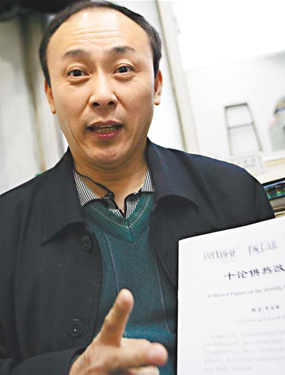-

Cheng Hong holds a document relating to his court battle about Beijing's heating system yesterday. Guan Xin
One resident's four-year fight against a heating company will go before a court for the fifth time, the longest such battle against unwanted public heating in Beijing.
Cheng Hong, a 53-year-old business strategy consultant, bought a 120-sq-m apartment in 2002 in Ximeng Liyuan, a community with more than 8,000 households in Fengtai district.
In order to suspend public heating in his apartment, Cheng has launched legal actions against his supplier four times over the past four years, and been to court numerous times. Cheng is fighting for the right to say no to heating and is not seeking compensation.
"I'm waiting for the latest trial of my fifth case against the heating company," said Cheng.
Cheng told METRO that he was working in the United States when his relatives helped him to sign a contract to purchase the apartment in 2002.
"The apartment was empty for the whole winter. I didn't need the heating supply but I still had to pay 3,600 yuan of heating as a precondition to get my flat's key," Chen said.
He returned to Beijing the following year.
After he started working in Beijing, Cheng, who lives by himself, usually went home later at night and said he felt no need for heating. Cheng said his supplier agreed to suspend the heating but still required 22 percent of the total heating fee.
"Actually we never suspended heating for Cheng's apartment because it would affect his neighbors' heating supply," said Jiang Hailan, deputy manager of the Bejing Ximeng Heating Supply Company.
"If a single apartment in a whole building is cold, it will decrease the temperature of its neighboring apartments. We wanted to continue the heating supply for Chen," she said.
Huang Wei, an associate researcher from the China Academy of Building Research, said if an apartment turns off its heating, it still can receive 80 percent of its average heating levels from neighboring apartments, reported by China Youth News.
Despite the agreement, Cheng's compromise ended in 2005.
"Because Cheng was the only person in the 8,000-household community who asked for suspension, we handled it privately. But he later aroused scores of residents to ask for suspensions and this made business difficult for us," said Jiang.
"The heating company turned the heating to my flat on again and asked me to pay the full fee," Cheng said.
Cheng sued Ximeng for forced heating in 2006 and lost his lawsuit. He appealed in the same year but failed again, with a verdict that said: "there are no charging-standard for household heating".
Ximeng then filed a case against Cheng in 2008 to pay outstanding fees from 2005 to 2007.
"The supplier won the case and I had to pay 10,862 yuan for three years of heating fees. It doesn't mean I will surrender to them but it's regulated if I want to file a new case. I have to do what the court asks," said Cheng.
He then filed his fourth case early this year and failed once more.
Cheng filed his latest case in the second half of this year and has attended court hearings twice, but with no verdict.
(China Daily 12/03/2009 page26)
